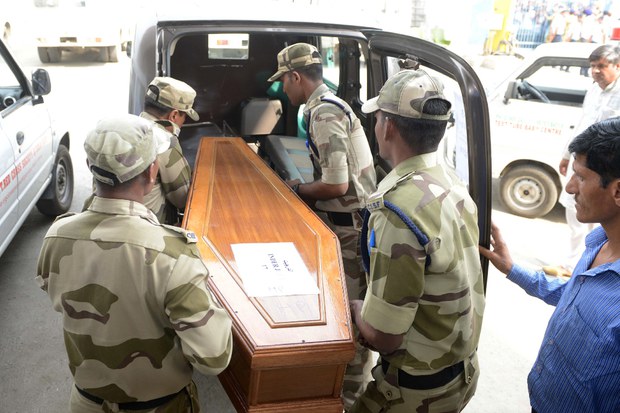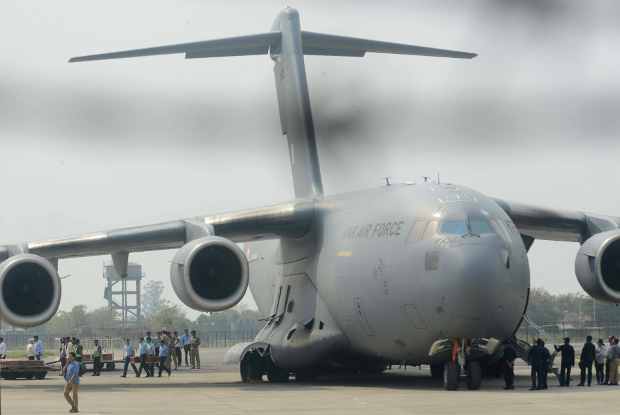Bodies of 38 Indian Hostages Killed by IS in Iraq Come Home
2018.04.02
New Delhi
 Security personnel carry the coffin of one of 39 Indian construction workers who were killed following their abduction by Islamic State fighters in Iraq in June 2014, after the bodies of 38 of the victims arrived at the Amritsar international airport on a special military flight, April 2, 2018.
Security personnel carry the coffin of one of 39 Indian construction workers who were killed following their abduction by Islamic State fighters in Iraq in June 2014, after the bodies of 38 of the victims arrived at the Amritsar international airport on a special military flight, April 2, 2018.
A military cargo plane on Monday brought home the skeletal remains of 38 Indian construction workers who were abducted and killed by Islamic State (IS) militants in Iraq four years ago.
The special flight from Iraq touched down at the international airport in Amritsar city, in northern India's Punjab state, at about 2:30 p.m. (local time) amid heavy security, and then the 38 coffins were loaded into waiting ambulances and hearses to be delivered to the relatives, officials said.
IS operatives had kidnapped 40 Indian workers employed with a construction firm soon after seizing the northern Iraqi city of Mosul in June 2014. Of the 40, one escaped and eventually returned to India, but the 39 others were executed by their captors, officials said.
Iraqi authorities had confirmed through DNA testing that 38 of the 39 bodies, which were exhumed from a mass grave near Mosul last year, belonged to the kidnapped Indian workers who were allegedly shot dead by IS operatives, Indian External Affairs Minister Sushma Swaraj told parliament last month.
The body of one worker – Raju Yadav, a native of Bihar state – could not be brought back as DNA testing on him had not yet been completed, said India’s Minister of State for External Affairs, V.K. Singh, who accompanied the caskets of the 38 from Iraq.
“But we have sent more DNA samples taken from Yadav’s relatives to Iraqi authorities and there is a possibility that the remains would be released soon as 70 percent of the DNA matching has already been done,” Singh told reporters.
Twenty seven of the 39 slain workers came from Punjab, six were from Bihar, four from Himachal Pradesh, and two from West Bengal, Singh said. Their bodies would be handed over to their families in their respective states without delay, he added.
Earlier in the day, Singh posted a video on Twitter of him loading one of the coffins into the C-17 aircraft in Baghdad, saying “The burden of certain responsibilities is great.”

‘We had faith in the government’
One of the abducted workers – Harjit Masih – managed to escape the massacre by pretending to be a Bangladeshi. He made his way back to India, where he told authorities that his 39 colleagues had been killed.
But the government initially refused to accept his claim until earlier this year, when Iraqi authorities confirmed the identities of the exhumed bodies.
“The Martyrs Foundation of Iraq worked very hard to identify the remains,” Minister Singh said, adding, “We are thankful to the authorities in Iraq for the help to locate the victims and exhume the mortal remains. The government of India did its best to know about the missing Indians.”
He said the workers had found work in Iraq through illegal agents, and this compounded the problem for the Indian government to carry out a search for them.
“This was my fourth trip to Iraq [since the workers disappeared]. Announcements were made on TV and radio for all Indians. None of the 40 workers had a record with the Embassy of India because they went via illegal agents,” Singh said.
About 10,000 Indians were living and working in Iraq when IS seized control of a third of the country, particularly the northern and central parts, in 2014. The terror group was subsequently beaten back by U.S.-supported Iraqi forces following a volatile three-year campaign.
In Punjab, state Cabinet Minister Navjot Singh Sidhu said his government would offer jobs to one relative of each of the 27 Punjabi workers killed in Iraq. He also announced individual payments of 500,000 rupees ($7,675) as compensation for the next of their kin.
Manjeet Kaur, wife of Davinder Singh, one of the 39 killed, said she hoped the state government would keep its promise.
“We hope the government gives us employment so that we can survive and educate our children. We had faith in the government. They said they will get him [Davinder] back [alive]. But what has come today is his mortal remains,” Kaur told ANI television in Punjab’s Jalandhar city after receiving her husband’s casket.







